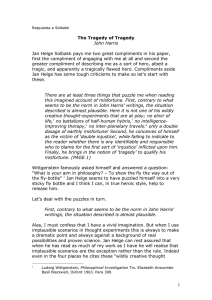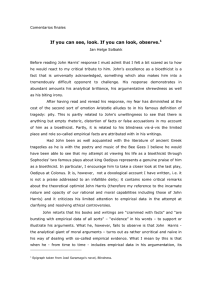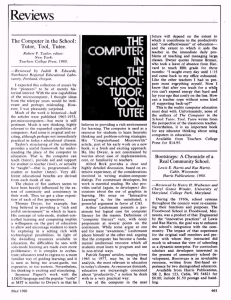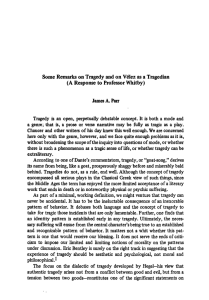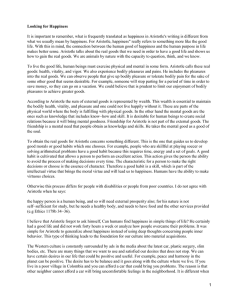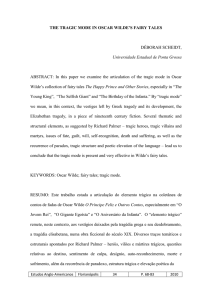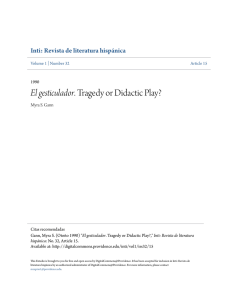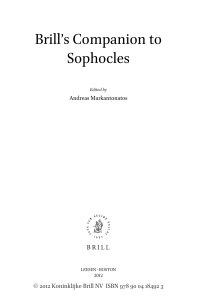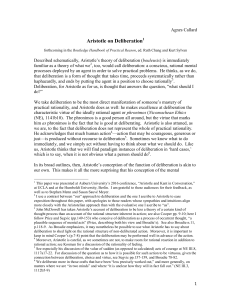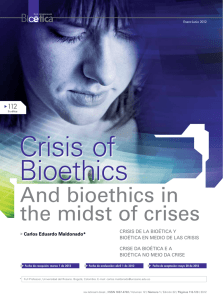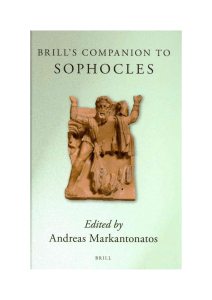The tragic nature of biomedical ethics In The Value of Life1 John
Anuncio
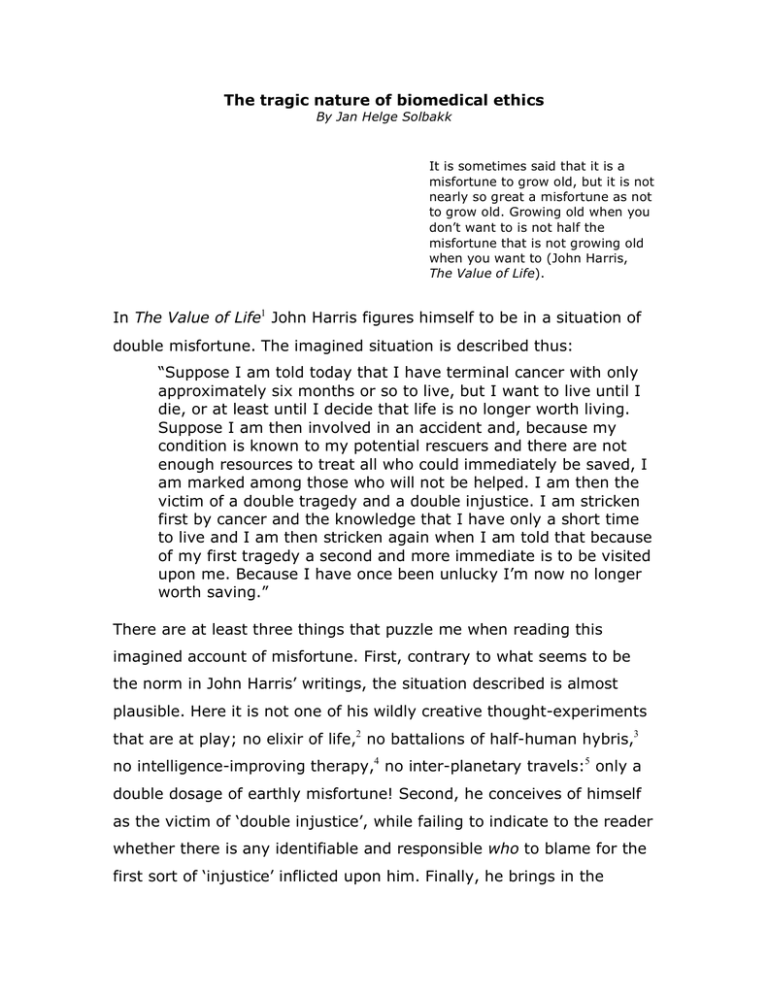
The tragic nature of biomedical ethics By Jan Helge Solbakk It is sometimes said that it is a misfortune to grow old, but it is not nearly so great a misfortune as not to grow old. Growing old when you don’t want to is not half the misfortune that is not growing old when you want to (John Harris, The Value of Life). In The Value of Life1 John Harris figures himself to be in a situation of double misfortune. The imagined situation is described thus: “Suppose I am told today that I have terminal cancer with only approximately six months or so to live, but I want to live until I die, or at least until I decide that life is no longer worth living. Suppose I am then involved in an accident and, because my condition is known to my potential rescuers and there are not enough resources to treat all who could immediately be saved, I am marked among those who will not be helped. I am then the victim of a double tragedy and a double injustice. I am stricken first by cancer and the knowledge that I have only a short time to live and I am then stricken again when I am told that because of my first tragedy a second and more immediate is to be visited upon me. Because I have once been unlucky I’m now no longer worth saving.” There are at least three things that puzzle me when reading this imagined account of misfortune. First, contrary to what seems to be the norm in John Harris’ writings, the situation described is almost plausible. Here it is not one of his wildly creative thought-experiments that are at play; no elixir of life,2 no battalions of half-human hybris,3 no intelligence-improving therapy,4 no inter-planetary travels:5 only a double dosage of earthly misfortune! Second, he conceives of himself as the victim of ‘double injustice’, while failing to indicate to the reader whether there is any identifiable and responsible who to blame for the first sort of ‘injustice’ inflicted upon him. Finally, he brings in the notion of ‘tragedy’ to qualify his misfortune. Later in the same chapter Harris once again returns to the notions of ‘misfortune’ and ‘tragedy’:6 “What the fair innings argument needs to do is to capture and express in a workable form the truth that while it is always a misfortune to die when one wants to go on living, it is not a tragedy to die in old age; but it is, on the other hand, both a tragedy and a misfortune to be cut off prematurely”. From this last statement, I suppose John Harris would also consider it a tragedy if he, a man of 65 and of fierce will to live on - did not reach the life span of a septuagenarian. For the rest of us, who still hope to be around when Harris is supposed to start profiting from the bonus of the envisaged additional years, the world would surely be a bleaker place to be if he was no longer there. We would certainly also thereby look upon himself and his dear family and also upon ourselves as the victims of misfortune and bad luck. Yet, none of us, I believe, would be justified in thinking of him as a victim implicated in some sort of tragedy. That is to say, to qualify the misery generated by the premature deaths described in Harris examples as tragic is to overstate the case; something more is needed before the plights required by tragedy may be said to be full-filled. To substantiate this point, I suggest to take a look at Aristotle’s famous definition of tragedy and his attempt at distinguishing between history and tragedy. In this way I also hope to make clear why it may pay off to investigate the ethico-didactic potentials encapsulated in a definition of tragedy of a less meager nature than the one alluded to by John Harris. Aristotle’s definition reads as follows:7 «Tragedy is a representation of a serious, complete action which has magnitude, in embellished speech, with each of its elements [used] separately in the [various] parts [of the play]; [represented] by people acting and not by narration; accomplishing by means of pity and terror the catharsis of such emotions”. From this definition and its context in the Poetics, several characteristics of tragedy and of tragic forms of misfortune are possible to identify. These are characteristics that sum up to a disqualification of Harris’ imaginary account as a genuine tragedy. The first is that tragedy deals with conflicts of a seemingly irresolvable nature, i.e. conflicts where the possibilities of resolution in terms of ‘compromise’ or ‘mediation’ between the parties involved seem to represent non-existing options. Second, whatever choice is made, it will by necessity lead to an extreme degree of misery and suffering.8 Characteristic of tragedy is, thirdly, an inexplicable disproportion of error or guilt (hamartia) and misery.9 Fourth, in situations of tragic conflict ‘choice’ is under a double constraint: The absence of a “guiltfree course” amidst the necessity to choose.10 In other words, the possibility of abstaining from making a choice is non-existing, as is the possibility of making a choice not contaminated with some sort of error or guilt (hamartia). The clause in the Poetics involving the notion of hamartia insists that in the ‘finest’ tragedy (the example here mentioned by Aristotle is Sophocles’ play Oedipus Tyrannus), the fall of the tragic agent into misfortune is not caused by wickedness, but is due to a great hamartia on the part of the agent himself. The meaning of hamartia varies according to the variety of individual tragic plots and plays Aristotle had at his disposal and ranges from purely epistemological forms of fallibility such as ‘mistake of fact’, ‘ignorance of fact’, ‘error of judgement’, ‘error due to inadequate knowledge of particular circumstances’ to full-fledged forms of moral failure such as ‘moral error’, ‘moral defect’, ‘moral flaw’, ‘moral weakness’, ‘defect of character’.11 Fifth, in his definition Aristotle points to tragedy as a dramatic representation of conflict evoking the emotions of pity and fear in the spectators watching the play. Finally, Aristotle alludes to a certain kind of catharsis that the watching of a tragic play may generate. I shall come back to the catharsis clause in Aristotle’s definition at the end of my paper, but first we shall take a closer look at Aristotle’s differentiation in Poetics 51a37-b33 of tragedy from history, as this may be of help in illuminating the kind of examples and situations of moral deliberation John Harris seems to be addicted to. The first of their distinguishing traits is that history narrates things that have happened, while tragedy relates to events or incidents that may happen. This is the reason, according to Aristotle, why tragic poetry is more philosophical than history; it speaks of universals, while history is an account of particulars. “A universal”, says Aristotle, “is the sort of thing that a certain kind of person may well say or do in accordance with probability or necessity – this is what poetry aims at, although it assigns names [to people]. A particular is what Alcibiades did or what he suffered”.12 The remark about the use of historical names in tragedies, and thereby about the representation of events that have actually taken place, is important, because it informs us that not everything in a tragedy is made up. More important, however, is the explanation Aristotle gives for the poet’s use of historical material (or what he and his public accepted as historical material). For tragic accounts to be trustworthy, they must be possible, and things which have happened, says Aristotle, are obviously possible. Consequently, by using events, names or things that have actually existed or taken place, as templates for giving shape to a tragic plot, the poet is free to “invent for himself” a whole that may have taken place.13 Thereby, out of the creative reconfiguration of the historical and particular, emerge neither imaginary accounts nor wild thought experiments but accounts that are possible and at the same time of universal relevance and value. These observations we may now use to assess the ethicodidactic potential of some of John Harris’ imaginary situations and thought experiments, including the example of double misfortune already mentioned. This brings me first to a comment he makes about the value of empirical facts in gene therapy research that I take as a telling indication of the prominent bioethicist’s complete lack of interest in the messy world of contingency:14 “Gene therapy may of course be scientifically problematic in a number of ways and in so far as these might make the procedure unsafe we would have some reason to be suspicious of it. However, these problems are ethically uninteresting and I shall continue to assume that gene therapy is tried and tested from a scientific perspective”. John Harris’ comment is preceded by two highly unrealistic, genetherapeutic situations, one where a genetic miracle cure against major infections, radiation, normal aging, heart diseases as well as carcinogens and environmental pollutants, has been found, while the other imagines a genetic device for improving intelligence in mentally handicapped and educationally impaired children.15 By way of these imaginary examples Harris then tries to carve out ethically consistent solutions to some of the dilemmas raised by gene therapy. The problem with these ‘solutions’, however, is that they, in spite of their consistency, do not represent solutions neither for the kind of human world we inhabit, nor, I believe, for a world that plausibly will come into existence; rather they seem to comply with the godly life-world aspirations Plato is warning against in book V of the Laws:16 “We have now dealt pretty completely with what divinity has to say of the institution which ought to be established, and the personal character to which all should aspire. On purely human considerations we have not touched, and yet we must; it is to men, not to gods, we are speaking”. For a bioethicist with so much confidence in the capacity of human reasoning and in considerations made by the ‘reasonable person’, it is puzzling to observe that Harris continues to operate as though ethical reasoning about human affairs may take place in a historical and geographical vacuum, i.e. without taking on board the particular time and space and related contingencies that actually color and shape the affairs and dilemmas he is trying to address! It is to this genuinely tragic side of John Harris’ career as a bioethicist I shall now turn my attention. That is, I shall try to show how Aristotle’s conception of tragedy may be used to display John Harris’ role in contemporary bioethics as the role of a tragic hero, and notably as one of the most prominent heroes within his tradition. In this way I also hope to give due credit to what I consider the most important contribution of Harris and his tradition to contemporary bioethics: the disclosure of the possibilities as well as of the fragility and insufficiency of rational forms of moral reasoning. According to the Aristotelian account of tragic character, there are four things at which the composer of tragedy should aim:17 • • • • the characters should be good, in the sense that they should neither be morally superior nor inferior to ourselves; second, they should be appropriate; third, they should be life-like; fourth and last, but not least, they should be consistent. In the attempt at applying these requirements to the bioethical story of John Harris, we may also profit from Aristotle’s suggestion, a little earlier in the Poetics, that the tragic hero should possess great reputation and fortune.18 For those of us who have had the chance of experiencing John Harris the bioethicist – in vivo as well as in print there is no doubt that our hero neatly complies with all four criteria in Aristotle’s account. Besides, he may certainly also be displayed as a character with an eminent, professional reputation as well as fortune. From the selection of John Harris as the main character of a tradition around which a tragic story of contemporary bioethics is to be crafted, we now have to search for suitable actions, events or incidents in the real life story, which may serve as a basis or template for inventing the tragic incident. According to Aristotle,19 there are four possible sorts of actions or incidents that may qualify as tragic actions or incidents: • • • • incidents where one acts in full knowledge, as is the case when Medea in Euripides’ homonymous play kills her children; incidents where one is about to act, in full knowledge, but abstains from performing the act; incidents where one acts, but performs the dreadful deed in ignorance, and recognizes afterwards what has taken place, as is the case in Sophocles’ play Oedipus Tyrannus; and finally, incidents where one is about to act, in ignorance, but then recognizes it before doing so. Among these four possible sorts of tragic actions or incidents, Aristotle qualifies the two last ones involving ignorance as the best options, number four as the very best, while he stigmatizes the second type of incident as the worst one.20 In the following I suggest to look for cues in our hero’s story that may fit with the characteristics of the third form of tragic action; i.e. an act done in ignorance followed by subsequent recognition of its dreadful effects. This brings me back to John Harris’ overconfidence in purist forms of reasoning and his tendency to constantly overlook the formative role of contingent facts in the shaping and perception of moral conflicts. Throughout his career as a bio-ethicist our hero has confidently acted as though empirical data counts for nothing in the clarification and or resolution of ethical controversies. Such neglect does not only imply a reductionist handling of moral issues; in the long run it may also develop into a more serious form of moral blindness: Blindness to the incarnate nature and opacity of our rational and moral capabilities. To proceed further in the remaking of our hero’s story, I shall now try to apply Aristotle’ qualifications of ‘tragic fortune’ to the situation of our agent. According to Aristotle,21 the following three situations disqualify as terrifying and pitiable events: • • • a virtuous person undergoing a change from good fortune to misfortune; such a change is only shocking; a wicked person passing from misfortune to good fortune; according to Aristotle, the most untragic of all changes; a thoroughly villainous person passing from good fortune to misfortune; “such a structure”, says Aristotle, “can contain moral satisfaction, but not pity or terror…”.22 It remains then only the situation where a person not superior to us in virtue and with a good reputation falls into misfortune not because of vice and wickedness, but because of some sort of hamartia. In order to further qualify the kind of hamartia committed by our hero, which evidently belongs to the class of epistemological errors previously mentioned, it would be important to try to trace the historical origin of the causal chain that inflicted upon him this blindness concerning the formative role of contingent facts. John Harris is a theoretical optimist and a utilitarian. But the constant tendency throughout his career to neglect the importance of empirical facts makes him at the same time a strange sort of utilitarian. This tempts one to ask what it was that inflicted upon him this unacknowledged sort of epistemological blindness. Genes? Educational environment? Philosophical schooling? The lack of medical or scientific training? Furthermore, is he to be considered an innocent victim of a misfortunate formation, or is he himself to blame for this? Finally, should he be made responsible for the consequences of this blindness in his thinking and acting as a bioethicist? The best kind of answer to these sort of questions, I think, is to be found in Sophocles’ first drama on king Oedipus, Oedipus Tyrannus, where the playwright gives us a paradigmatic example of what possibilities of resolution intellectual and emotional freedom gives to an agent not willing to sacrifice his dignity in order to escape the intolerable pain of ‘guilt-free guilt’.23 Oedipus’ final act and word in the drama is therefore not to claim himself the innocent victim of misfortune (tuche), but to react with horror and self-accusation to the terrible consequences of his acts and to stigmatise himself with blindness.24 This does not, however, amount to saying that Oedipus was guilty of the misery his acts of ignorance had caused upon his family and his people, only that he felt himself personally responsible for making visible to them his previously unacknowledged suffering from intellectual and mental blindness. This brings me finally to Sophocles’ last play, Oedipus at Colonus,25 which displays the fallen king in his old age. This poetic account reflects the possible life of value of a tragic hero capable of living with the moral aftermaths of his previously unacknowledged deeds and acts. For most of us, included a sage and octogenarian in nuce like John Harris, Oedipus at Colonus represents the kind of play that may bring catharsis to the fragile entirety of aspirations, beliefs, desires, fears, longings and forms of knowledge that make up our lives as bioethicists. But in this respect we are all in need of some sort of tragic reminder, so as to keep us aware of our own inflictions of hamartia. REFERENCES 1 2 3 4 5 6 7 8 9 10 11 12 13 14 15 16 17 18 19 20 London: Routledge, 1985, pp. 87-102, reprinted in H. Kuhse, P. Singer (Eds.), Bioethics. An Anthology, Blackwell Publishers 1999 (pp. 365-372), p. 366. Harris, p. (1985) 2001, p. 371. J. Harris, Wonderwoman and Superman. The Ethics of Human Biotechnology. Oxford: Oxford University Press, 1992, p. 151. J. Harris, “Is Gene Therapy a Form of Eugenics?”, Bioethics, vol. 7, no. 2/3, 1993, pp. 178-187, reprinted in H. Kuhse. P. Singer (Eds.), Bioethics. An Anthology, Blackwell Publishers, 2001, (pp. 165-170), p. 168-169. J. Harris, ”The Survival Lottery”, Philosophy, vol. 50, 1975, pp. 81-87, , reprinted in H. Kuhse. P. Singer (Eds.), Bioethics. An Anthology, Blackwell Publishers, 2001, (pp. 399-403), p. 400-401. Harris, (1985) 2001, p. 368. Aristotle, Poetics 49b23-31. In: Janko, R. (Ed. and translator), Aristotle. Poetics I with Tractatus Coislinianus. A Hypothetical Reconstruction of Poetics II. The Fragments of the On Poets. Indianapolis/Cambridge: Hackett Publishing Company, 1987. P. Burian, “Myth into muthos: the shaping of tragic plot”. In: Easterling P.E. (Ed.), The Cambridge Companion to Greek Tragedy (pp. 178-208). Cambridge: Cambridge University Press, 1997, p.181. H. Kuhn, “The true tragedy. On the relationship between Greek tragedy and Plato” Harvard Studies in Classical Philology, 52, 1941(pp. 1-40), p.12. M.C. Nussbaum, The fragility of goodness: luck and ethics in Greek tragedy and philosophy. Cambridge: Cambridge University Press, 1986, p. 34. J.H. Solbakk, “Moral dialogue and therapeutic doubt”, Journal of Medicine and Philosophy, 29, 1, 93-118. Aristotle, Poetics 51b8-12, transl. R. Janko. Poetics 53b23-27. J. Harris, “Is Gene Therapy a Form of Eugenics?”, Bioethics, vol. 7, no. 2/3, 1993, pp. 178-187, reprinted in H. Kuhse. P. Singer (Eds.), Bioethics. An Anthology, Blackwell Publishers, 2001, (pp. 165-170), p. 169. Harris (1993) 2001, p. 167-169. Plato, Laws V, 732d7-e4, In: E. Hamilton, H. Cairns (Eds.),The collected dialogues of Plato, including the letters. Bollingen Series LXXI. Princeton, New Jersey: Princeton University Press, 1989. Aristotle, Poetics 54a16-30. Poetics 53a11-12. Poetics 53b14-38. Poetics 53b39-1454a9. 21 22 23 24 25 Poetics 52b32-53a17. Poetics XIII. 1453a3-5. K. von Fritz, K, Tragische Schuld“. In: von Fritz, K. (Ed.), Antike und Moderne Tragödie.Neun Abhandlungen, Berlin:Walter de Gruyter & Co 1962, (pp. 1112), p. 39. Sophocles, Oedipus Tyrannus, 1329-1334. In: H. Lloyd-Jones (Ed.), Sophocles I.Cambridge, Massachusetts, London: The Loeb Classical Library. Harvard University Press, 1994. Sophocles, Oedipus at Colonus. In: H. Lloyd-Jones (Ed.), Sophocles II. Cambridge, Massachusetts, London: The Loeb Classical Library. Harvard University Press.
